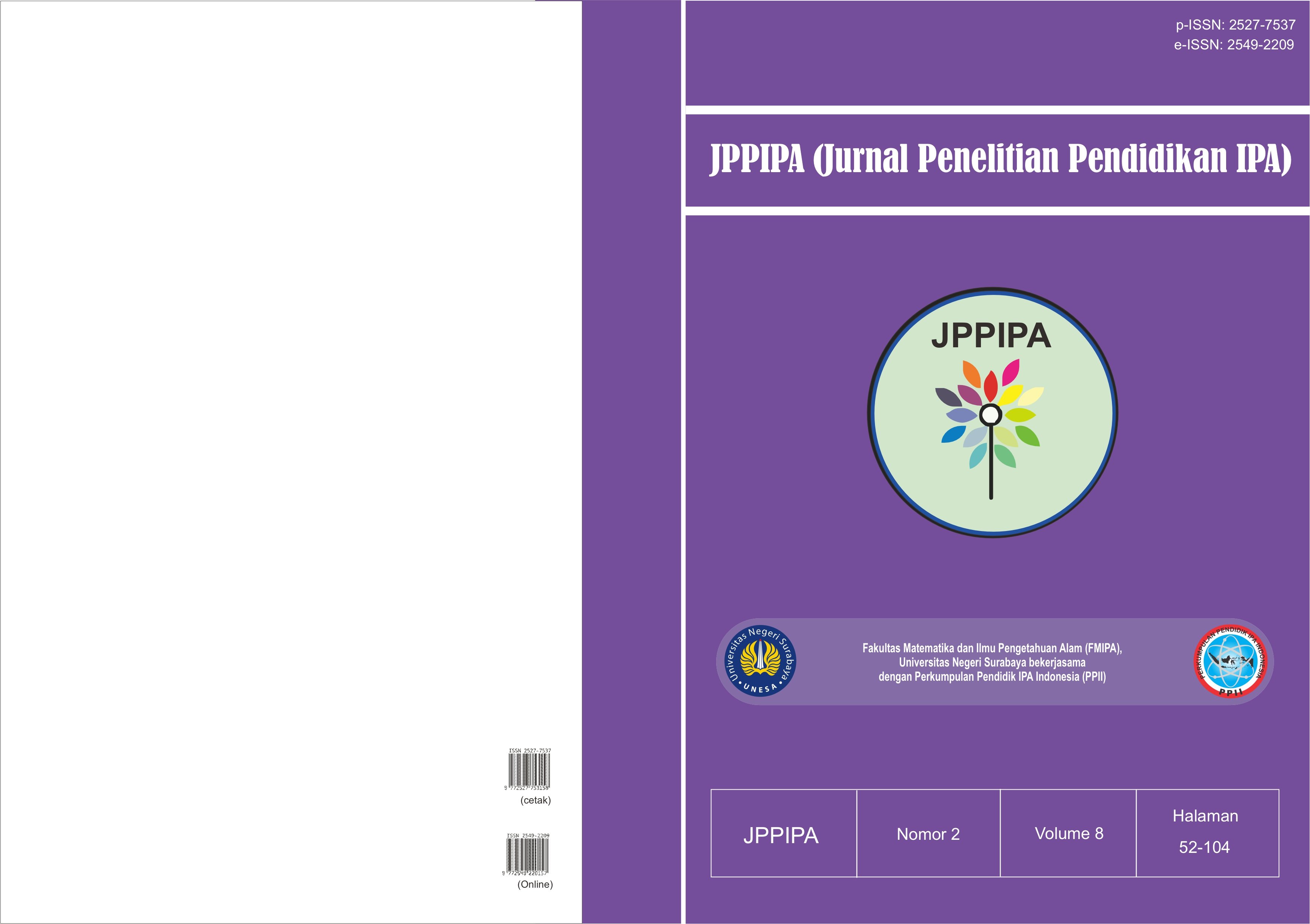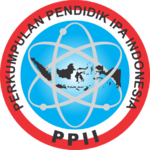IMPLEMENTATION OF COOPERATIVE LEARNING INDEX CARD MATCH ON SECONDARY STUDENTS’ SCIENCE COGNITIVE LEARNING OUTCOMES
DOI:
https://doi.org/10.26740/jppipa.v8n2.p89-97Keywords:
Index Card Match, Cooperative Learning, Science Learning, Secondary School, Learning OutcomesAbstract
Science learning is often associated with difficult topic to understand, lecture-dominated instructions, and low participation rate in classroom learning. Similar situation is observed at a secondary school in West Sumatra province, Indonesia. The observation also revealed that students’ cognitive learning outcomes is still under the minimum passing criteria for the topic of the earth's layer. To the citizen of an area that is in high-risk of natural disaster occurrence, sound understanding on the topic is crucial. Since science lesson is designed to develop students’ thinking and problem-solving ability, such understanding is important regarding students’ survival rate. If this situation remains unaddressed, it is concerning that achieving the goals of science lesson, especially related to the topic of Earth’s layer, will be constrained. Therefore, this study offers a solution by implementing the Cooperative Learning Index Card Match (CL-ICM) to see its impact on students’ cognitive learning outcomes. This quasi-experimental research used non-equivalent control group design andh purposive sampling technique to select 67 seventh graders from two classes as experiment and control group. A set of 20 multiple-choice questions was validated and tested for reliability as research instruments to measure students’ learning outcomes. Data was then analyzed with parametric statistics technique followed by hypothesis testing using independent sample t-test. The result of data analysis gave the sig. of 0.091, which led us to decide that the null hypothesis is accepted and research hypothesis (Ha) is rejected. Therefore, it can be summarized that the implementation of CL-ICM does not give significant impact on students’ cognitive learning outcomes on the topic of the earth's layer.
References
Ahmadi, I. (2011). Strategi Pembelajaran Sekolah Terpadu. Prestasi Pustaka.
Annisa, F., & Marlina, M. (2019). Penerapan Model Pembelajaran Kooperatif Tipe Index Card Match Terhadap Aktivitas dan Hasil Belajar Matematika Peserta Didik. Jurnal Basic Edu, 3(4). https://doi.org/https://doi.org/10.31004/basicedu.v3i4.209
Ariza, A. M. (2018). Pengaruh Model Pembelajaran Index Card Match (ICM) Terhadap Aktivitas Belajar Pada Mata Pelajaran PKn Siswa Kelas IV Madrasah Ibtidaiyah Muhammadiyah Panampu. Universitas Muhammadiyah Makasar.
Burhanuddin, & Imran, A. (2003). Managemen Pendidikan. Universitas Negeri Malang.
Decree No. 20 on National System of Education, 26 (2003).
Fraenkel, J. R., & Wallen, N. E. (2008). How to Design and Evaluate Research in Education (7th Editio). McGraw-Hill Companies, Inc.
Mulyasa, E. (2009). Kurikulum yang Disempurnakan: Pengembangan Standar Kompetensi dan Kompetensi Dasar. Remaja Rosdakarya.
Nasution, N. E. A., Harsono, T., Rizka, C., & Almeda, R. (n.d.). The Effect of Index Card Match Model on Students Learning Outcomes and Activity in Ecosystem Topic for Grade X SMA N 8 Medan.
Piter, F. D. (2020). Pengaruh Penerapan Model Pembelajaran Kooperatif Index Card Match Terhadap Hasil Belajar Biologi Siswa Kelas XI SMA Negeri 6 Palopo. Universitas Cokroaminoto Palopo.
Purwanti, W. (2014). Keintegrasian Materi IPA dalam Kurikulum 2013. Universitas Negeri Yogyakarta.
Rahim, A., Jumadi, I, W., & H, K. (2019). The Effect of PjBL Model Based on Skill Approach Process to Physics Critical Thinking Ability of High School Students. Journal of Physics Conference Series, 1233 (1). https://doi.org/10.1088/1742-6596/1233/1/012040
Rahmawati, S., & Dadi, D. (2019). Pengaruh Penerapan Model Pembelajaraan Kooperatif Tipe Index Card Match terhadap Aktivitas dan Hasil Belajar Siswa pada Konsep Komponen Ekosistem. Bioed: Jurnal Pendidikan Biologi, 7(1).
Sari, M. I., Rustopo, & Agustini, F. (2019). Keefektifan Model Pembelajaran Index Card Match terhadap Hasil Belajar Mata Pelajaran IPA. International Journal of Ekementary Education, 3(1). https://doi.org/https://doi.org/10.23887/ijee.v3i1.17283
Susanti, R., Anwar, Y., & Ermayanti. (2019). Implementation of learning based on scientific approach to improve science process skills of biology education students in general biology course. Journal of Physics Conference Series, 1166. https://doi.org/10.1088/1742-6596/1166/1/012004
Wagner, T. (2010). Overcoming The Global Achievement Gap. Cambridge Mass Harvard University.
Zaini, H. (2008). Strategi Pembelajaran Aktif. Pustaka Insan Madani.
Downloads
Published
How to Cite
Issue
Section
 Abstract views: 322
,
Abstract views: 322
, PDF Downloads: 350
PDF Downloads: 350












